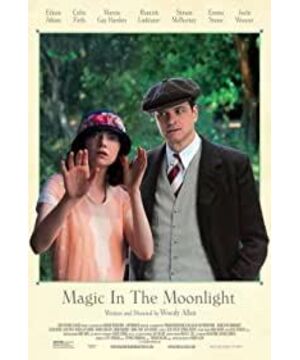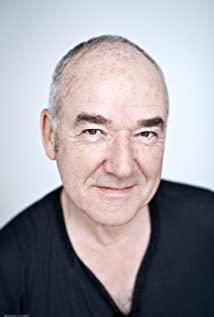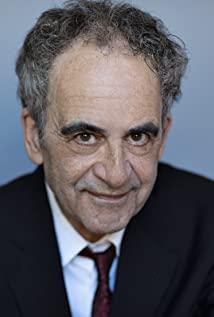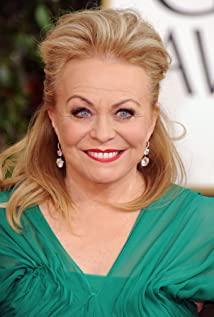I tried to write this review in the format my teacher asked for. "Magic Moonlight", as the title of the film wants to express, this film revolves around the appearance and disappearance of magic, recognition and criticism, and unfolds another love story between a middle-aged uncle and a young woman. The story takes place in the south of France in 1928. Simply speaking, this year has no concept for most people. The time line is about 10 years away from "Downton Abbey", which has double-accepted word-of-mouth ratings. Therefore, the sets and costumes in the play are , the character's inertial thinking mode, culture, etc. have similarities. The difference is that the story of "Downton Abbey" takes place before World War I and continues until the end of World War I. At that time, the inherent class was not broken, and most people still obeyed the more traditional medieval European cultural etiquette. And "Magic Moonlight" is a "money worship era" in which society regained stability and all industries recovered after the end of World War I. Rich businessmen easily became nobles, and rich people like to watch more exaggerated tricks and pursue fresh and exciting entertainment. The male protagonist Stanley is a "best magician in the world" and a genius who is very fluffy, pursues perfection, is defiant, and has an irresistible charm like "syphilis" (from the second male who is the boyfriend's friend at the beginning of the film. No. Howard's very objective subjective evaluation: "You are still the best in the world, and you are still a perfectionist, a snob, A good fusion, the character's characteristics eventually become more reasonable, more ordinary, more normal, more flesh and blood, let's call him a "better self". Besides, although Stanley is a very mean, even unlikable person. , A very talented genius in a certain field. But he is also a very emotional person, which does not conflict with his rationality, but it also hinders his pure rationality. This is reflected in his affection for his aunt and for Howard. After meeting Sophie, Stanley struggles with whether to believe Sophie is a real medium, until Sophie meets his aunt and deciphers a string of pearls. The aunt's views, attitudes, and the director's choice of the aunt's incident as the point of change in the hero's attitude all shaped Stanley's emphasis on his aunt. On the other hand, in terms of friendship with Howard, although Howard was the man behind the trick, Stanley, a face-loving and mean figure, quickly forgave his friend and did not take Howard's rhetoric. refute. This all reflects Stanley's more emotional side, and also ambush the source of his entanglement and doubt in rationality. The last thing I want to mention is that the male protagonist in "Magic Moonlight" opened a door to his life because he "believed" in one thing, and a big change took place. Like the male protagonist in 2015's "The Unreasonable", because he "decided to do" one thing, he also opened a door to his life and changed a lot. The routine is exactly the same. This may be the director's desire to express the breakthroughs and changes that American middle-aged men need to find at that age, in order to end this boring, 40-year-old life. After talking about the characters and plot, you can talk about a few sets of camera language. The film's narrative style and shooting style are very conservative and single. The tall ones in the dwarf still found a few shots that can be analyzed. The first shot, from 3 minutes 55 seconds of the film. is a long close to a minute take followed by the lens. In the male protagonist's movement, the environment (backstage), the male protagonist's social status, the male protagonist's work status, style, and most importantly, the male protagonist's mean and sharp personality are respectively shown. relatively representative. Especially for the audience who watched a 3-minute magic show without any narration at the beginning, which provided a lot of information for the confused audience. The second lens is the contrast lens. A comparative analysis of Howard's share of the screen before and after Howard was behind the scenes. In my imagination, since Howard was a small servant before, he did not turn into a precursor to the big devil, and most of the shooting angles, lighting, etc. given to him were relatively marginal or dark. After he was announced as the mastermind behind the scenes, I was looking forward to the comparison of his confrontation with Stanley, but the director was very clever not to let the two be on the same screen, and the confrontation scenes were all completed by relationship shots. But Howard does have the rare close-up shots that are well-lit. Personally, I don't think it is enough to highlight the contrast between his before and after images. But the director's performance is also completely understandable. Stanley is in the role of debunking, while Howard is in the role of inferiority. The two are equally important in expressiveness, and it is indeed indistinguishable on the same screen. After the film, the two people and the good pair of drinks finally showed the relationship between the two to be completely equal on the camera. It then mentions the use of two cinematic elements, both of which are clearly used in the magic show that opens the film. The first element is the "disappearing elephant". The first encounter between the heroine and the heroine was also the disappearing elephant who watched the hero's performance when they were children. However, after the subsequent scam was exposed, the authenticity of this content could not be determined. . The second element is "reappearance after disappearance". This trick is used again when the male protagonist handsomely exposes the routine of the female protagonist and the male second. It is very classic, and there are also some surprises and shocks. At the same time of debunking, it is also a ruthless irony of the second male under the suit. Finally, a little thought about the movie: Assuming that the medium is real, will it reduce the pain of death for the living, or the regret of the dead, and reduce people's fear of death? It would be ironic if it did affect people's perceptions of death. ...this movie is really mediocre. In fact, I just want to quietly watch Meimei's costumes and all the aesthetics of that era... The whole article doesn't involve montages and the like, and I don't have the analytical awareness in this regard, I want to bless~ darker. After he was announced as the mastermind behind the scenes, I was looking forward to the comparison of his confrontation with Stanley, but the director was very clever not to let the two be on the same screen, and the confrontation scenes were all completed by relationship shots. But Howard does have the rare close-up shots that are well-lit. Personally, I don't think it is enough to highlight the contrast between his before and after images. But the director's performance is also completely understandable. Stanley is in the role of debunking, while Howard is in the role of inferiority. The two are equally important in expressiveness, and it is indeed indistinguishable on the same screen. After the film, the two people and the good pair of drinks finally showed the relationship between the two to be completely equal on the camera. It then mentions the use of two cinematic elements, both of which are clearly used in the magic show that opens the film. The first element is the "disappearing elephant". The first encounter between the heroine and the heroine was also the disappearing elephant who watched the hero's performance when they were children. However, after the subsequent scam was exposed, the authenticity of this content could not be determined. . The second element is "reappearance after disappearance". This trick is used again when the male protagonist handsomely exposes the routine of the female protagonist and the male second. It is very classic, and there are also some surprises and shocks. At the same time of debunking, it is also a ruthless irony of the second male under the suit. Finally, a little thought about the movie: Assuming that the medium is real, will it reduce the pain of death for the living, or the regret of the dead, and reduce people's fear of death. It would be ironic if it did affect people's perceptions of death. ...this movie is really mediocre. In fact, I just want to quietly watch Meimei's costumes and all the aesthetics of that era... The whole article doesn't involve montages and the like, and I don't have the analytical awareness in this regard, I want to bless~ darker. After he was announced as the mastermind behind the scenes, I was looking forward to the comparison of his confrontation with Stanley, but the director was very clever not to let the two be on the same screen, and the confrontation scenes were all completed by relationship shots. But Howard does have the rare close-up shots that are well-lit. Personally, I don't think it is enough to highlight the contrast between his before and after images. But the director's performance is also completely understandable. Stanley is in the role of debunking, while Howard is in the role of inferiority. The two are equally important in terms of expressiveness, and it is indeed indistinguishable on the same screen. After the film, the two people and the good pair of drinks finally showed the relationship between the two to be completely equal on the camera. It then mentions the use of two cinematic elements, both of which are clearly used in the magic show that opens the film. The first element is the "disappearing elephant". The first encounter between the heroine and the hero was also the disappearing elephant who watched the hero's performance when they were children. However, after the subsequent scam was exposed, the authenticity of this content was not confirmed. . The second element is "reappearance after disappearance". This trick is used again when the male protagonist handsomely exposes the routine of the female protagonist and the male second. It is very classic, and there are also some surprises and shocks. At the same time of debunking, it is also a ruthless irony of the second male under the suit. Finally, a little thought about the movie: Assuming that the medium is real, will it reduce the pain of death for the living, or the regret of the dead, and reduce people's fear of death. It would be ironic if it did affect people's perceptions of death. ...this movie is really mediocre. In fact, I just want to quietly watch Meimei's costumes and all the aesthetics of that era... The whole article doesn't involve montages and the like, and I don't have the analytical awareness in this regard, I want to bless~ I watched the disappearing elephant performed by the male protagonist at the time, but after the scam was exposed later, I could not be sure of the authenticity of this content. The second element is "reappearance after disappearance". This trick is used again when the male protagonist handsomely exposes the routine of the female protagonist and the male second. It is very classic, and there are also some surprises and shocks. At the same time of debunking, it is also a ruthless irony of the second male under the suit. Finally, a little thought about the movie: Assuming that the medium is real, will it reduce the pain of death for the living, or the regret of the dead, and reduce people's fear of death. It would be ironic if it did affect people's perceptions of death. ...this movie is really mediocre. In fact, I just want to quietly watch Meimei's costumes and all the aesthetics of that era... The whole article doesn't involve montages and the like, and I don't have the analytical awareness in this regard, I want to bless~ I watched the disappearing elephant performed by the male protagonist at the time, but after the scam was exposed later, I could not be sure of the authenticity of this content. The second element is "reappearance after disappearance". This trick is used again when the male protagonist handsomely exposes the routine of the female protagonist and the male second. It is very classic, and there are also some surprises and shocks. At the same time of debunking, it is also a ruthless irony of the second male under the suit. Finally, a little thought about the movie: Assuming that the medium is real, will it reduce the pain of death for the living, or the regret of the dead, and reduce people's fear of death. It would be ironic if it did affect people's perceptions of death. ...this movie is really mediocre. In fact, I just want to quietly watch Meimei's costumes and all the aesthetics of that era... The whole article doesn't involve montages and the like, and I don't have the analytical awareness in this regard, I want to bless~
View more about Magic in the Moonlight reviews











